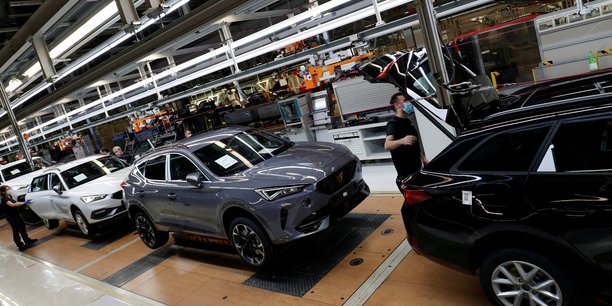The US government announced on Thursday that it will provide $1.7 billion in subsidies to the auto industry to enable it to develop its production lines for electric vehicles as well as parts or components such as batteries.
In detail, these grants will particularly target companies established in the states of Georgia, Michigan and Pennsylvania, which could prove decisive in the race for the White House, which will pit outgoing President Joe Biden against his predecessor. As a reminder, the election is scheduled for November 5.
The grants, which are part of the Inflation Reduction Act, President Biden’s big green plan, will be intended for about ten factories that have closed their doors or are threatened, installed in eight different states. The goal is to adapt them to the production of electric vehicles or spare parts for these vehicles, which should make it possible to save or create 15,000 jobs, according to a press release from the White House.
” These investments will create thousands of well-paying jobs and retain even more by helping companies in the sector adapt their industrial tools and re-employ in the same factories and communities. “, the US president declared, quoted in the press release.
Tariffs on Chinese products
This announcement is part of both the White House’s desire to strengthen the construction of electric vehicles in the United States, especially by protecting the sector from Chinese competition, which it considers unfair, and the re-election strategy of the outgoing president, whose fate will especially depend on these industrial states, historically hard hit by deindustrialization.
For months, US officials have pointed out the risk of Chinese overproduction in many sectors, dumping large volumes of products at knockdown prices on world markets in general, and US markets in particular, risking destabilizing domestic industries. In this context, Joe Biden pushed his strategy of more or less direct confrontation on the economic level with Beijing a little further, with the risk of seeing the trade war resume. Thus, the White House announced in May a significant increase in the tariffs imposed on the equivalent of $18 billion worth of Chinese products.
These new tariffs relate to nearly ten industrial sectors deemed to be ” strategic »such as semiconductors, critical minerals, medical products or even electric vehicles, the latter e.g. see their tariffs rise from 25% to 100%.
Europe increases its tariffs
But the United States is not the only one to raise its voice against the subsidies that Beijing gives to its manufacturers.
The European Union has entered into a conflict with Beijing, which it accuses of distorting its market by flooding it with cheap products, not just for metals. Thus, in early July, Europe imposed additional tariffs of up to 38% on imports of Chinese electric cars as a precautionary measure, before a final decision in November accusing Beijing of illegally favoring its manufacturers.
Following an anti-subsidy investigation launched in October, Brussels announced the surcharges on June 12 as it opened talks with Beijing to try to resolve the issue and mitigate the risk of a trade war. But in the face of ” unfair subsidies » granted under Brussels to Chinese companies, these rights ” compensators » added to the 10% taxes that the EU already applies to vehicles imported from China.
(With AFP)
